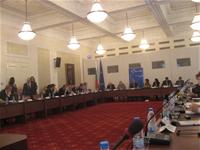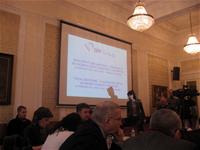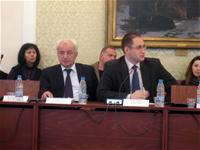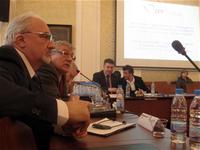Between fiscal discpline and popular love
Adelina Marini, March 7, 2011
 I have noticed that in our country (Bulgaria) a scary lot of people perceive the state as something separate from them; as something that has its own money; something which they cannot influence; and something which must at all costs take care of them. Probably this perception is due to the bad education which the children of many generations receive at school and which cannot teach them that the state this is us; that every action or inaction of ours has one way or another an impact on those that come after us; that the money of the state is actually our money in the form of taxes, fees, labour, etc. In other words, when we expect something from the state it is worth thinking whose money we actually want to take and whether our demands are well grounded or not.
I have noticed that in our country (Bulgaria) a scary lot of people perceive the state as something separate from them; as something that has its own money; something which they cannot influence; and something which must at all costs take care of them. Probably this perception is due to the bad education which the children of many generations receive at school and which cannot teach them that the state this is us; that every action or inaction of ours has one way or another an impact on those that come after us; that the money of the state is actually our money in the form of taxes, fees, labour, etc. In other words, when we expect something from the state it is worth thinking whose money we actually want to take and whether our demands are well grounded or not.
It is astonishing that this perception is shared equally as by uneducated people, so by people who studied, people who hold decision making positions, whose decisions a lot of things or people depend on. By the way, the reactions on the Ministry of Finance's idea to introduce a Financial Stability Pact is an absolute proof of my impressions.
The good news
One of the really few things which the current government is trying to do (I say trying because until it odes we will not be certain that it will and, besides, it depends on how it will do it) is to impose order in spending of budgetary money or, as it is more modern to call it in the developed countries, public money. However, in Bulgaria under "public money" probably a lot of people understand common money. To some extent this is true, but not common in terms of everyone can get as much as he wants to, but that it is for common goals. So, when we've come to realise that public money helps achieve the goals of society for prosperity and development, there is nothing better than the courage to put a brake on your spending in the name of long-term goals, especially when they are not your own. The problem is that the government will do that not until 2013.
The second good news is that, although the announcement of the intentions for fiscal discipline came a little bit as a surprise and without many explanations and debates, ultimately there was a public discussion that took place in Sofia and was organised by the Bulgarian Member of the European Parliament (MEP) Nadezhda Neynsky with the participation of Alain Lamassoure (Chairman of the Committee on Budgets), László Surjan (member of the Committee on Budgets) and Salvador Garriga Polledo (a member of the same Committee). The round table was also attended by the entire political spectrum in Bulgaria, by leading economists, representatives of business. Guests were many ambassadors of EU member states and not that many journalists.
Why fiscal discipline is necessary?
Generally this was the question around which the discussion was held on  February 22nd. The only representative of the executive at the round table in the National Assembly was Minister of EU funds Tomislav Donchev. He started his statement saying that fiscal discipline should not be something forcefully imposed by politicians against citizens' will: "This must be a shared value. For the purpose citizens must know what fiscal discipline means, what its impact is and how dangerous and to what long term and harmful consequences budgetary dissipation leads".
February 22nd. The only representative of the executive at the round table in the National Assembly was Minister of EU funds Tomislav Donchev. He started his statement saying that fiscal discipline should not be something forcefully imposed by politicians against citizens' will: "This must be a shared value. For the purpose citizens must know what fiscal discipline means, what its impact is and how dangerous and to what long term and harmful consequences budgetary dissipation leads".
Of course this has to be a shared value and, when this is not implicitly enshrined in the mentality of growing-ups through corresponding education, it is necessary the government to explain with every action of its, in detail, and not as if talking to an electorate. The Minister did not say anything else and a little after his statement he left the round table. Martin Dimitrov, leader of the Union of Democratic Forces and Chairman of the parliamentary Committee for Economic Policy, Energy and Tourism, made a very strong speech, in which however he demonstrated the famous Bulgarian inferiority complex by saying that since big nations, like France and Germany, are introducing fiscal boards, why shouldn't we.
Though he managed to defend his position very well, saying: "Because you are aware that countries like Germany, France, Spain, Hungary can receive external funding much easily in tough situation. Their governments can borrow under several times lower interest rates than Bulgaria (currently 3 times lower interest rates). And here is the logical question - why are these powerful economies currently debating on the idea of introducing fiscal rules? The answer is as follows - because even they need a clear message for their citizens, for European institutions and all investors - of stability. After the crisis and everything that happened globally we all need signs of stability".
Mr Dimitrov pointed the expected positive effects of fiscal discipline as being reduction of interest rates, which would be key for competitiveness and for the survival of small and medium businesses. Besides it could be expected investments to increase after they hit a record low in 2010. And another very important thing, of which we rarely think in Bulgaria, is:
"Yes, you'll say, this is a problem most European countries are facing. True. But the difference is that Bulgaria is situated between Greece and Romania - the two countries with very serious problems into the crisis. Do have in mind that many investors perceive our region as a risky and we urgently need signals that would show that we will ensure stability and that the events of 1996-1997 in Bulgaria will not be repeated, that we are stable and it is worth people to come here and risk their money, investing in Bulgaria, creating well paid jobs. So, introducing fiscal rules is one of the mechanisms".
 The senior economist with the Open Society Institute, Georgi Angelov, almost entirely shared the opinion of Martin Dimitrov, the politician, adding another thing that is important to be taken into account and it is that from time to time populist governments come to power, who "have no long-term vision and just want to spend as much money as possible, while the debts are to be paid by next governments. In other words, it is already very obvious why such rules are needed - to restrict the possibility a government, which by accident happens to be too populist, to create a great burden for next generations".
The senior economist with the Open Society Institute, Georgi Angelov, almost entirely shared the opinion of Martin Dimitrov, the politician, adding another thing that is important to be taken into account and it is that from time to time populist governments come to power, who "have no long-term vision and just want to spend as much money as possible, while the debts are to be paid by next governments. In other words, it is already very obvious why such rules are needed - to restrict the possibility a government, which by accident happens to be too populist, to create a great burden for next generations".
He recalled the very interesting fact that yet in the distant 1986, when unelected Bulgarian governments boasted before citizens with the success of five-year terms and planned economy, James Buchanan received a Nobel prize not for something else but because he proved why fixated rules for budget deficits are necessary.
In fact, one of the foreign guests at the round table, the French MEP and Chairman of the Committee on Budgets, Alain Lamassoure, recalled that the eurozone has been created at the very beginning with strict rules [outlined in detail in the Stability and Growth Pact]. "It's odd to have to recall that, it's obvious. It was laid down from the very beginning in the Maastricht Treaty, establishing the Monetary Union. And we have forgotten that in the Treaty are enshrined very clearly a range of sanctions for those countries which don't comply with the rules of fiscal discipline. But what happened is that these provisions were forgotten, they were not applied when they should have been applied in the around 2005 when the first countries ran off the track and forgot the so called Maastricht criteria. France and Germany were too big to be punished".
Mr Lamassoure explained that fiscal discipline was necessary because when common currency is used it must be ensured that "good pupils won't be obliged directly or indirectly to pay for the bad pupils". Moreover, the French MEP added that in spite that Bulgaria was not a member of the euro area, it was also obliged to apply fiscal discipline and to comply with the decisions, taken by the euro area, as it is in a currency board, pegged to the euro.
Besides, he said, supported later by Georgi Angelov, the best discipline is the national discipline, conformed with European rules. As Mr Angelov added: "Furthermore, the best way is for us to abide with budget discipline than to rely on someone in Brussels to punish us when we don't. This has never worked so far for one reason or another and this procedure cannot be very much relied to, not to mention that it is better to avoid a problem than afterwards be punished for creating it".
And just when the discussion was gaining speed, guests started to leave - whether because they were bored or for more important tasks. And, in fact, it was a very interesting discussion, because a lot of interesting opinions were heard, like that of the Hungarian MEP, Laszlo Surjan, also from the group of the European People's Party. He is a relatively old man who raised the issue of coherence between the former communist countries and the developed European economies. An issue, indeed, often raised by central European member states. He even used a very interesting term - eastern wages - having in mind their much lower value than salaries in western nations.
More curious in his statement, however was the obvious understanding that this problem cannot be solved by simple and automatic increase of wages, but by increasing productivity. This lesson must have been very painful for the Hungarians, if we remember the political crisis of 2006, sparked by the revelation of records of the then left-wing premier Gyurcsany, who admitted that he had lied for the situation with the country's public finances. Then Hungary resorted to IMF's assistance and still is in excessive deficit procedure. According to Mr Surjan, however, fiscal discipline does not mean only less spending but also prudent spending. EU funds might prove to be serious assistance for the new member states to increase competitiveness, he added.
A budget for all. But all for a budget?
At the round table another issue was also raised which is inherently related to fiscal discipline - the future of the next multiannual financial framework, the negotiations on which are expected to heat up in the summer, as in June the European Commission is to present its vision about the main guidelines that the future budget should follow. The new member states insist, if not for increasing, at least the current volume of the budget to be kept. It seems that at this stage consent is not impossible to be reached on this issue. However, a subject of furious disputes are expected to be the tiers of the budget.
The old member states, given their budgetary problems, are getting more aggressive in their demand the assistance for the new member states to be reduced and, instead, more investments to be made for science and boosting of economic growth. According to Alain Lamassoure on the agenda is also how the budget to be financed as it is already clear that in times of austerity member states will be less prepared to contribute to the common good. He recalled that with its establishment the EU financed its budget with own resources but for 15 years now it has been financed by the member states' contributions.
"It won't be possible, only if we find own new resources. If it is not the case it will be impossible for Bulgaria, for Hungary or even for France to continue to take advantage of the Cohesion funds, Structural funds, Agriculture policy, etc."
To this, though, Georgi Angelov reacted sharply by saying: "It has been said [the EU budget] it must be increased in order the EU could achieve its competitiveness goals. But let us remember that half of the budget goes for agriculture subsidies which is the most ineffective part of any spending. In other words, the agriculture subsides must simply be removed and the money to be invested in science and the EU will achieve all its goals easily".
Pact for competitiveness
Unfortunately the issue of the debated at EU level Pact for Competitiveness, proposed surprisingly by France and Germany at the European Council on February 4th, was not raised at all. An exception made only the ambassador of Hungary, Ms Judith Lang, who said in her welcoming address in the beginning of the round table,  that almost nothing was available from this pact. Hungary, in its capacity of a president of the EU, supports the measures for stabilising the euro area but based upon coordination, she emphasized.
that almost nothing was available from this pact. Hungary, in its capacity of a president of the EU, supports the measures for stabilising the euro area but based upon coordination, she emphasized.
Obviously, since February 22nd when Her Excellency said that, the Hungarian position has evolved because on March 2nd, in an interview for the Presidency's website, the Hungarian Minister of Foreign Affairs, János Martonyi, said that if the six proposals in the pact were not to be endorsed, it would be very difficult for the markets to be convinced that the EU was still capable of creating something new, like deeper integration of economic policy. To the question whether he feared that thus a two-speed Europe would be created, Mr Martonyi said:
"There are two answers to this. First, two-speed Europe has been with us for a while, as some countries are inside the Eurozone, and others are not. Secondly, speed is the only difference. It is the duty of each member state outside the monetary union (except the UK and Denmark) to join. They will join, the only question is when. What many fears, is not the two-speed Europe, but a Europe of two tiers. That would mean a permanent state with a narrow “hard core” emerging, and a wider circle of countries, loosely connected to the integration. I do not think anybody wants that to happen".
We, in euinside, also do not think and have said this many times in one way or another, but this depends entirely on the fiscal discipline of the governments and the citizens of member states. And also on the political will to pursue common European priorities and not short-term domestic goals.
photos: Konstantin Pavlov - Komitata